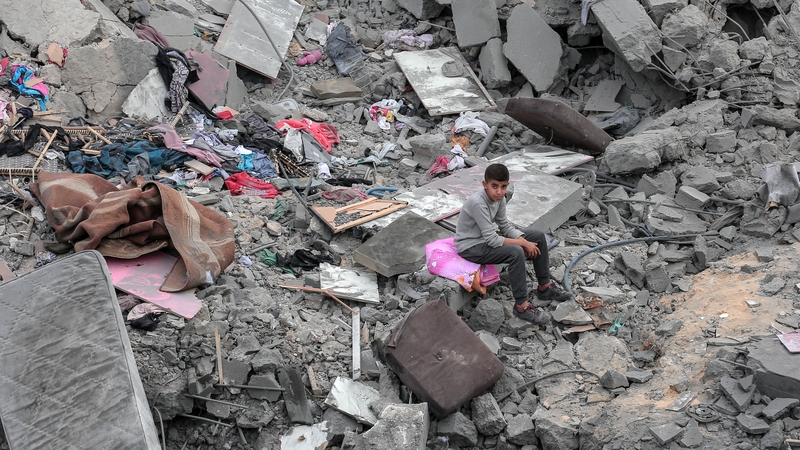The EU has called on Israel to open additional crossings besides the Cyprus maritime corridor so that more aid can reach Gaza.
"While supporting the Cyprus maritime corridor, we call on Israel to open additional crossings so more aid can reach Gaza, including the North, and to ease overall customs restrictions", EU Commissioner for Crisis Management Janez Lenarcic said on social media.
The statement came after Lenarcic virtually met with Cypriot Foreign Affairs Minister Constantinos Kombos, US Secretary of State Antony Blinken, British Foreign Minister David Cameron, AEU Foreign Affairs Minister Abdulrahman Al Thani and UN Humanitarian and Reconstruction Coordinator for Gaza Sigrid Kaag.
It comes as Israel earlier said that it would help get more aid to the northern part of the Palestinian enclave amid famine fears.
Earlier, Palestinian health officials said Israeli fire killed five people at a food distribution centre in southern Gaza's Rafah.
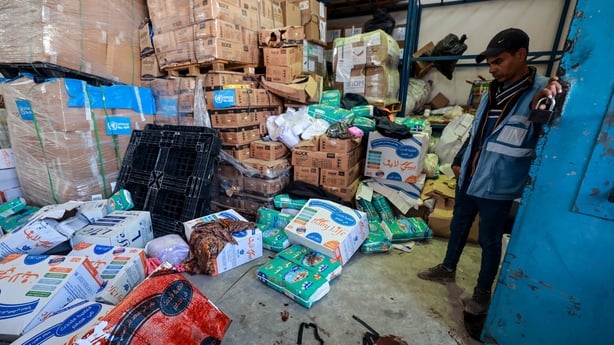
The Israeli military said it was looking into the incident in Rafah, where more than half of Gaza's 2.3 million population is sheltering, after the main UN agency for Palestinians (UNRWA) said one of its facilities had been hit.
At least one UNRWA staff member was among the five killed and 22 others were injured, the agency said, even though the facility's coordinates had been shared with the Israeli military.
Israel says it tries to minimize civilian deaths as it battles Hamas militants in urban areas.
"Today's attack on one of the very few remaining UNRWA distribution centres in the Gaza Strip comes as food supplies are running out, hunger is widespread and, in some areas, turning into famine," said UNRWA chief Philippe Lazzarini.
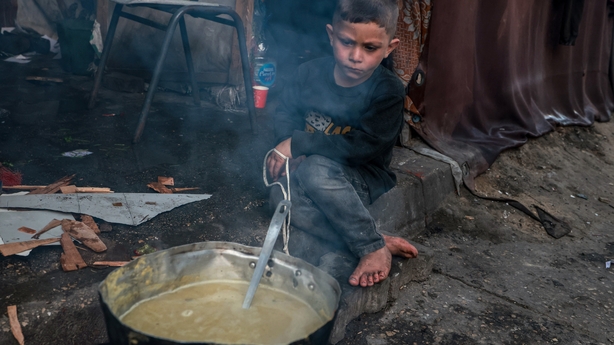
The incident comes amid mounting concern about worsening humanitarian conditions in Gaza, where Israel has carried out military operations since October intended to eliminate the Hamas militant group.
An UNRWA spokeswoman said the facility was used "to distribute much-needed food and other lifesaving items to displaced people in southern Gaza".
At least 165 UNRWA employees have been killed since the beginning of the Israel-Hamas war in October, the UNRWA statement said.
"More than 150 UNRWA facilities were hit, some totally destroyed, among them many schools," it said.
'How can they bombard us?'
An AFP photographer saw victims of the strike arriving at Al-Najjar hospital in Rafah, at least one of whom was identified by other people at the hospital as a UN employee.
Witnesses said the strike compounded security fears in Rafah, which is overcrowded with 1.5 million mostly displaced people, further marring the normally festive Muslim fasting month of Ramadan which began on Monday.
"It's an UNRWA centre, expected to be secure," said Rafah resident Sami Abu Salim.
"Some came to work to distribute aid to the people in need of food during the holy month of Ramadan. Suddenly, they were struck by two missiles."
Hasan Abu Auda, displaced from Beit Hanoun in northern Gaza, said people had come to the warehouse "to sustain themselves for their daily meals".
"It's Ramadan today," he said. "How can they bombard us during the month of Ramadan?"
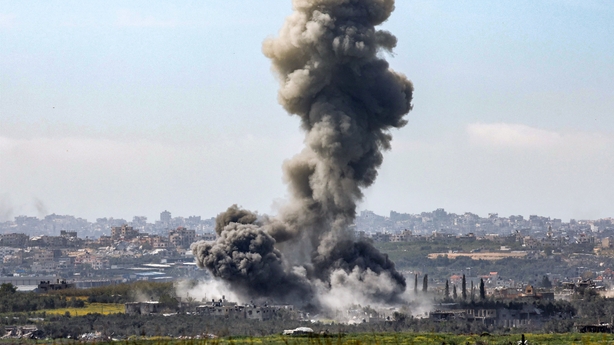
The war in Gaza was triggered by Hamas's unprecedented 7 October attack on southern Israel, which resulted in the deaths of about 1,160 people, mostly civilians, according to an AFP tally of Israeli official figures.
Israel's retaliatory military campaign in Gaza has killed at least 31,272 people, mostly women and children, according to the health ministry in the Hamas-run territory.
Gaza's dire food shortages after more than five months of war have resulted in 27 deaths from malnutrition and dehydration, most of them children, the ministry says.
Cumbersome Israeli security checks on all cargoes entering the territory slow down the delivery of aid, and some trucks are sent back when they are found to contain forbidden items, aid workers say.
Israeli authorities say bottlenecks are caused by aid piling up on the Palestinian side as there are not enough trucks to distribute it.
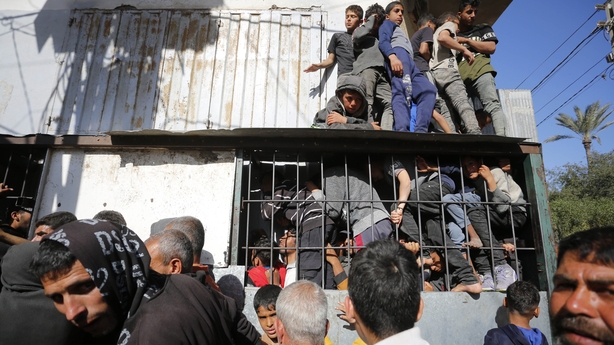
"We have been taking efforts to facilitate more aid into northern Gaza," Israeli government spokesperson Tal Heinrich told journalists. "This was a pilot to prevent Hamas from taking over the aid as they often do."
Hamas has denied Israel's accusations and says Israel is using famine to pressure the Palestinian population.
Israeli Prime Minister Benjamin Netanyahu said he was determined to have UNRWA replaced by other agencies without harming aid distribution, over the agency's alleged links with Hamas militants.
Weeks of talks involving US, Qatari and Egyptian mediators had aimed to bring a truce and hostage release deal before the start of the Muslim holy month of Ramadan, but missed the Monday deadline.
Qatari foreign ministry spokesman Majed al-Ansari said that, although talks continued, "we are not near a deal".
Mr Netanyahu has doubled down on his pledge to "destroy Hamas" - including by sending troops into Gaza's last area so far spared ground operations, far-southern Rafah.
In remarks to Dutch Prime Minister Mark Rutte, Mr Netanyahu "emphasised... that entering Rafah is essential to realising the goals of the war, and that unilateral recognition of a Palestinian state would be considered an achievement by Hamas".
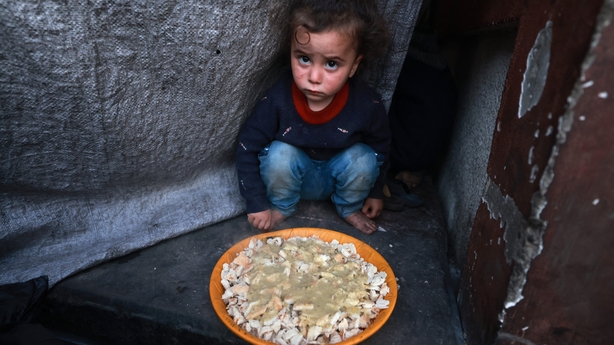
The prospect of a Rafah invasion has sparked global alarm because it is crowded with almost 1.5 million mostly displaced people.
Gaza's dire food shortages after more than five months of war and siege have killed 27 people through malnutrition and dehydration, most of them children, according to the Gaza health ministry.
Fahd al-Ghoul, a resident of Jabalia Camp in the north, said: "We have been fasting against our will for two months or more."
"Now with Ramadan, nothing changes in our reality," the 50-year-old added.
The British foreign office has said 150 tonnes of UK aid had entered Gaza, adding that a field hospital would also arrive this week.
As aid agencies warn the truck deliveries and airdrops fall far short of meeting the desperate need, European nations and the United States have announced plans to send more relief goods by sea.
US President Joe Biden last week announced plans for the military to build a pier on Gaza's coast, and four US Army vessels left a base in Virginia yesterday carrying about 100 soldiers and equipment.
The offshore platform and pier are expected to be up and running "at the 60-day mark", US Army Brigadier General Brad Hinson told journalists.
About half a dozen Arab and Western nations have airdropped food parcels on parachutes into Gaza, and Morocco has sent a planeload of relief supplies via Israel's Ben Gurion airport.
The UN World Food Programme, trying an alternative land route from southern Israel, sent an initial six aid trucks Tuesday into worst-hit northern Gaza, through a gate in the security fence, the Israeli army said.
The WFP said it had "delivered enough food for 25,000 people" and demanded that, "with people in northern Gaza on the brink of famine, we need deliveries every day. We need entry points directly into the north."
